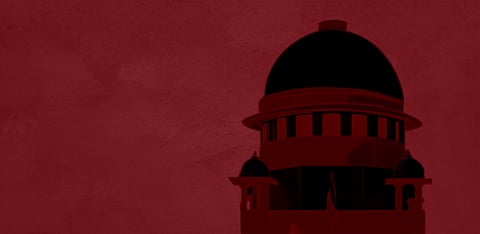

A two-judge Bench comprising Justices Surya Kant and Dipankar Datta made observations to this effect while granting bail to one Rabi Prakash, who has been facing prosecution under the Narcotic Drugs and Psychotropic Substances Act, 1985, and has been languishing in jail for over three years.
—
IN a significant Order, the Supreme Court has observed that prolonged incarceration as an undertrial militates against the right to life and personal liberty guaranteed under Article 21 of the Constitution.
Under such circumstances, liberty must override the statutory embargo under Section 37 (offences to be cognisable and non-bailable) of the Narcotic Drugs and Psychotropic Substances Act, 1985 (NDPS Act), the court has observed.
A two-judge Bench comprising Justices Surya Kant and Dipankar Datta made observations to this effect while granting bail to one Rabi Prakash, who has been facing prosecution under the NDPS Act, and has been languishing in jail for over three years.
Section 37 of the NDPS Act puts rigorous conditions for the grant of bail. According to it, the public prosecutor must be given an opportunity to oppose the application for such release.
The Section also provides that the court should be satisfied that the accused is not guilty and would not commit any offence while on bail.
The petitioner was one of the occupants of a truck from which 247 kg of ganja was recovered. He sought bail from the Supreme Court in a crime registered at the Semiliguda police station, district Koraput, under Section 20(b)(ii)(C) of the NDPS Act.
Favouring the release of the accused, the Bench noted: "Though the trial had commenced, only one out of the 19 witnesses has been examined so far. The conclusion of the trial can be expected to take some more time."
As regards the twin conditions contained in Section 37 of the NDPS Act, the Bench noted that the first condition, that a public prosecutor must be heard, has been complied with.
Regarding the second condition: formation of an opinion as to whether there are reasonable grounds to believe that the petitioner is not guilty, the Bench opined that the same might not be formed at this stage when the accused has already spent more than three-and-a-half years in custody.
"Prolonged incarceration generally militates against the most precious fundamental right guaranteed under Article 21 of the Constitution and in such a situation, the conditional liberty must override the statutory embargo created under Section 37(1)(b)(ii) of the NDPS Act," the Bench added.
The Bench thus ordered the release of the accused on bail on his furnishing bail bonds to the satisfaction of the trial court. It also directed that he should be required to produce two local sureties before the trial court.
"The petitioner shall also appear before the trial court on every date of hearing. In case he absents himself, it shall be taken as a misuse of concession of bail granted to him today by this court," the Bench ordered.
Earlier this year, a division Bench comprising Justices S. Ravindra Bhat and Dipankar Datta had observed that grant of bail on the ground of undue delay in a trial could not be fettered by the stringent conditions under Section 37 of the NDPS Act.
The Bench had noted that "laws which impose stringent conditions for grant of bail, may be necessary in public interest; yet, if trials are not concluded in time, the injustice wrecked on the individual is immeasurable."
In 2021, a three-judge Bench of which Justice Kant was part, held that a constitutional court could grant bail to an accused facing prosecution under the Unlawful Activities (Prevention) Act, (UAPA), 1967 on grounds of violation of fundamental rights notwithstanding the rigors of Section 43D(5) of the UAPA which prohibits the grant of bail if the court is satisfied that the allegations against the accused are prima facie true.
A three-judge Bench led by Justice N.V. Ramana, which also included Justice Aniruddha Bose had said that the rigors of Section 43D(5) of the UAPA would melt where there is no likelihood of a trial being completed within a reasonable time and the period of incarceration already undergone had exceeded a substantial part of the prescribed sentence.
Click here to read the Order.